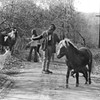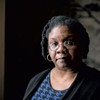Published August 7, 2002 at 4:00 a.m.
In a society that abhors aging, particularly in women, one word inspires significant fear and loathing: menopause. Although it’s as natural as a sunset or moonrise, the “change of life” that follows the childbearing years has remained a dirty little secret that few people — least of all men — want to talk about.
Suddenly, it’s a hot topic. By the time Menopause: Bridging the Gap Between Natural and Conventional Medicine officially hit stores last Thursday, a first printing of 5000 copies had already sold out and a second printing is going fast.
Those figures are good news for the three Vermonters who collaborated on the 132-page project: Winooski resident Lorilee Schoenbeck, a naturopathic physician, Burlington OB-GYN Dr. Cheryl A. Gibson and Hinesburg psychiatrist M. Brooke Barss. They attribute their instant-bestseller status to last month’s abrupt halt of the Women’s Health Initiative, a major national study of hormone replacement therapy (HRT), after researchers detected an increased risk of breast cancer with long-term use.
“The timing is unbelievable,” muses Gibson, a clinical associate professor at the University of Vermont’s College of Medicine. “What we address in the book is actually reflected in that study. So the results are a confirmation of our work, with real science behind it.”
Thanks to advances in health care, people are living longer. That means menopause statistics continue to climb. An estimated 31.2 million women were menopausal in 2000. By 2020, that figure is expected to reach 45.9 million.
With HRT in question, the estrogen-deprived everywhere are wondering what to do next. “It’s been a madhouse here since early July,” Gibson says of the Burlington-based Planned Parenthood of Northern New England, where she is the medical director. “We’ve been bombarded with requests.”
Schoenbeck thinks that hormone replacement became a one-size-fits-all prescription. “Women have too often been placed on HRT by practitioners who didn’t assess their specific situations,” she notes. “It should never have been given to such a broad range of people without considering individual family histories and risk factors.”
Gibson also believes that the risk-versus-benefit equation should always be examined. “Hormone therapy is good for some women, but not appropriate for everyone,” she observes.
Menopause tackles its subject from every angle. As the title suggests, the authors discuss both standard and nontraditional approaches to alleviating such symptoms as hot flashes, mood swings, memory loss, bladder problems, vaginal dryness, weight gain and insomnia. They also explore perimenopause — menopause-like hassles caused by diminishing levels of estrogen while a woman is still in her reproductive years.
The three co-authors believe their book is unique. “There’s no lack of information available out there,” Schoenbeck points out. But “we didn’t want just to inform; we wanted to clarify. Others have written either a do-it-naturally or do-it-conventionally treatise. I saw the need for a resource that would support women in navigating both options. We tried to have a less biased view because the truth is mostly somewhere in the middle.”
“All three of us are on the young side of meno-pause,” acknowledges Cheryl Gibson, who is 48 and has endured a few telltale signs. Lorilee Schoenbeck, 39, prefers not to discuss her personal connection to the condition, except that she treats women at her offices in Shelburne and Middlebury, as well as at the Vermont Women’s Choice in Burlington. Her specialty is nutrition, botanical medicine and natural hormone therapy.
“The idea for this book was really driven by our patients,” Schoenbeck explains. “I practice with Cheryl at Vermont Women’s Choice, a Planned Parenthood full-service gynecological clinic that merged with the Vermont Women’s Health Center a year ago.”
When additional insight is needed, they refer patients to each other and to Barss, a UVM clinical associate professor of psychiatry who deals with psychopharmacology, substance-abuse disorders and what she calls “gynechiatry.”
“Cheryl might be able to do something for a woman with hot flashes or vaginal pain who I can’t help,” Schoenbeck says. “If she has no luck with someone’s perimenopause or premenstrual syndrome, maybe I will. Or if a patient has more depression than I can handle, I send her to Brooke.”
Gibson contributed two chapters to the book and Barss delivered one, while Schoenbeck did most of the writing and polishing. “Lorilee put it all in one voice,” Gibson explains.
“We shipped the chapters to each other for comments, critiques and changes,” Schoenbeck recalls. “Luckily, there was very little disagreement.”
The threesome does agree that menopause — which some consider an affliction — “exists on a wide continuum, from no symptoms to, say, continual hot flashes,” Schoenbeck says. “Therapies are also on a continuum, from the most natural and least invasive to the most invasive. We offer guidelines to help women understand where they are on that spectrum. The book’s goal is to allow them to work with their own practitioners and draw from both sides of the fence, if need be. My experience has been 75 to 80 percent success with natural medicines.”
Unfortunately, that success pattern is largely anecdotal. “Although natural medicine options are now more important than ever, there’s been very little research because herbs cannot be patented,” Schoenbeck says, referring to the pharmaceutical industry’s desire for profits. “There were few studies on women’s health care in general until the feminist movement of the 1970s. The baby-boom generation refused to swallow the assumption that women lose their value when their reproductive years end.”
Gibson, who cites menopause as “an ignored subject until the last 20 years,” received little training in potential treatments while she was in medical school and during her residency at UVM in the 1980s. “HRT was the only management choice I learned about,” she says. “In the early 1990s, I tried to find out more about it on my own before meeting Lorilee a few years later.”
Untreated menopause can lead to heart disease, loss of bone density and myriad lesser complaints. Some women feel generally unwell because the now-missing female hormone is so pervasive. “There are estrogen receptors in every cell type in the body, right down to the teeth and nails,” Schoenbeck explains.
People who use HRT for an extended time period might be susceptible to various cancers. But Schoenbeck acknowledges that treatment with herbs or other botanical preparations is not entirely understood. “We can’t say with certainty that natural estrogen is safer than synthetic,” she says. “We don’t have the information to say it with authority. Not enough studies have been done. In some cases, there have been no studies.”
The menopause book — put out by Twin Streams, an imprint of the Kensington Publishing Corp. in New York City — has been a harmonious endeavor for the Vermont authors. They even had the good fortune to be assigned an editor going through the change of life herself.
Despite different disciplines and viewpoints, the team presents an objective analysis. Yet Schoenbeck definitely has an alternative point of view. “Estrogen was a product in search of a market in the 1960s,” she theorizes, “mostly driven by very misogynist male doctors who believed women shrivel up without it.”
Ironically, the Wisconsin-born Schoenbeck is firmly rooted in conventional Western medical ideas. “I have a long lineage of doctors,” she says. “My paternal great-grandfather was an intern-ist. My grandfather was a general surgeon and so was my father — he used to take me on rounds with him after church on Sundays. My mother was a nurse. At age 2, I wanted to become a brain surgeon.”
Several experiences later intervened to alter that plan. Schoenbeck attended Goddard College, a school with a progressive educational philosophy, in 1985 and 1986. As a pre-med student at the University of Wisconsin, a classmate introduced her to nontraditional notions just as she was applying to medical schools. She decided to pursue her doctorate degree at the five-year National College of Naturopathic Medicine in Portland, Oregon.
“Shock waves rippled through my family,” Schoenbeck remembers. “At first my dad thought I had sold my soul to the devil. But he became a convert by my fourth year, as he saw the level of training I was getting in areas like anatomy, physiology and dissection. He would tell other practitioners we met, ‘She’s going to keep people healthy and put us out of business.’”
In 1995, Schoenbeck’s father even wrote a letter to Governor Howard Dean urging him to sign a bill that allowed the licensing of naturopathic physicians in Vermont. By then, she had returned to the state to set up her practice.
When she started working as a part-time independent provider at Women’s Choice in February, it signaled the first time any Planned Parenthood clinic in the country had ever incorporated naturopathic medicine. “It’s a pilot project to see if patients from a conventional practice can benefit when alternatives are offered,” says Schoenbeck, who somehow finds the time to contribute articles to magazines such as New Woman and Mother Earth News.
When it comes to menopause, the book she wrote with Gibson and Barss argues that women “deserve accurate and thoughtful advice, respectful dialogue and plenty of options when approaching this transition.”
They end their four-page introduction with a kind of blessing that readers will be able to “find radiant health in these, your ‘crowning’ years.” It’s a lovely thought, but perhaps “radiant” is not the best word to use when directed at women suffering from hot flashes.
More By This Author
Comments
Comments are closed.
From 2014-2020, Seven Days allowed readers to comment on all stories posted on our website. While we've appreciated the suggestions and insights, right now Seven Days is prioritizing our core mission — producing high-quality, responsible local journalism — over moderating online debates between readers.
To criticize, correct or praise our reporting, please send us a letter to the editor or send us a tip. We’ll check it out and report the results.
Online comments may return when we have better tech tools for managing them. Thanks for reading.












































